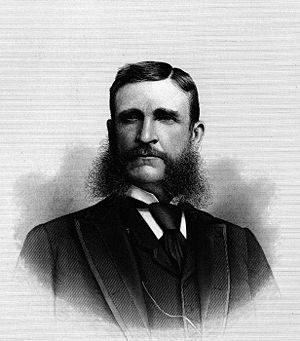John Thomas Caine
| John Thomas Caine | |
|---|---|
 |
|
| Delegate to the U.S. House of Representatives from Utah | |
| In office November 7, 1882 – March 3, 1893 |
|
| Preceded by | George Q. Cannon |
| Succeeded by | Joseph L. Rawlins |
| Member of the Utah Senate | |
| In office 1896 |
|
| Personal details | |
| Born | January 8, 1829 Patrick, Isle of Man |
| Died | Script error: The function "death_date_and_age" does not exist. Salt Lake City, Utah |
| Resting place | Salt Lake City Cemetery Lua error in package.lua at line 80: module 'strict' not found. |
| Political party | Democratic |
| Occupation | Teacher Newspaper publisher |
| Religion | The Church of Jesus Christ of Latter-day Saints (Mormon) |
John Thomas Caine (January 8, 1829 – September 20, 1911) was a delegate to the United States House of Representatives from the Territory of Utah.
Biography
Born in the parish of Patrick, Isle of Man, Caine attended the common schools in Douglas, Isle of Man.
Caine immigrated to the United States in 1846 and lived in New York City until 1848, when he went to St. Louis. He converted to The Church of Jesus Christ of Latter-day Saints (LDS Church) in New York in March 1847.
Caine settled in the Territory of Utah in 1852 and taught school. He served as secretary of the territorial council during the sessions of 1856, 1857, 1859, and 1860. He was one of the founders of the Salt Lake Herald in 1870, serving as managing editor and president. He served as delegate to the Utah constitutional conventions in 1872 and 1882. He served as member of the territorial council in 1874, 1876, 1880, and 1882.
Caine served as City Recorder of Salt Lake City in 1876, 1878, 1880, and 1882.

Caine was elected as a Democrat to the Forty-seventh Congress to fill the vacancy caused by the action of the House declaring the Delegate-elect ineligible. The election had been won by George Quayle Cannon (18,567 votes), but the other contestant Allen G. Campbell (1357 votes) successfully contested the outcome. The House of Representatives refused to seat either man, and instead allowed Caine to fill the position in the 47th Congress. He was reelected as a Democrat to the Forty-eighth, Forty-ninth and Fiftieth Congresses and on the People's Party ticket to the Fifty-first and Fifty-second Congresses and served from November 7, 1882, to March 3, 1893. He was not a candidate for renomination in 1892.
Caine was an unsuccessful Democratic candidate for the position of first governor of the newly formed State of Utah in 1895 (the Act of Statehood took effect on January 2, 1896).
Caine served as member of the Utah State Senate in 1896, after which he resumed the management of the Salt Lake Herald.
Caine died of cystitis in Salt Lake City, Utah.[1] He was interred in the Salt Lake City Cemetery.
Caine is the namesake of Caineville, Utah.[2]
See also
Notes
- ↑ State of Utah Death Certificate
- ↑ Lua error in package.lua at line 80: module 'strict' not found.
References
External links
![]() Media related to Lua error in package.lua at line 80: module 'strict' not found. at Wikimedia Commons
Media related to Lua error in package.lua at line 80: module 'strict' not found. at Wikimedia Commons
| United States House of Representatives | ||
|---|---|---|
| Preceded by | Delegate to the U.S. House of Representatives from Utah 1882-1893 |
Succeeded by Joseph L. Rawlins |
![]() This article incorporates public domain material from websites or documents of the Biographical Directory of the United States Congress.
This article incorporates public domain material from websites or documents of the Biographical Directory of the United States Congress.
Lua error in package.lua at line 80: module 'strict' not found.
- Wikipedia articles incorporating text from the Biographical Directory of the United States Congress
- 1829 births
- 1911 deaths
- Mormon pioneers
- Converts to Mormonism
- Delegates to the United States House of Representatives from Utah Territory
- Manx emigrants to the United States
- Manx Latter Day Saints
- Utah State Senators
- Utah Democrats
- People's Party (Utah) politicians
- Members of the Council of Fifty
- Burials at Salt Lake City Cemetery
- British leaders of The Church of Jesus Christ of Latter-day Saints
- 19th-century American politicians

